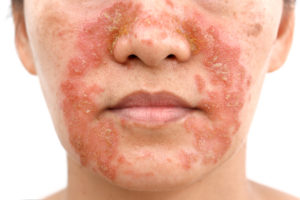Optimal Treatment for Eczema on Face: A Dermatologist’s Advice

Eczema, a chronic skin condition characterized by inflammation, itchiness, and redness, can be particularly challenging when it affects the face. The visibility of facial eczema can affect one’s self-esteem and daily life, making effective treatment for eczema on the face a priority for many sufferers. In this article, we’ll delve into the best practices for managing and finding the right treatment for eczema on the face, aiming to provide relief and restore skin health.
The first step in the treatment for eczema on the face is identifying the specific type of eczema you’re dealing with, as this can influence the most effective treatment strategies. While there are several types of eczema, atopic dermatitis is the most common form to affect the face. Understanding your triggers is also crucial, as this can help prevent flare-ups.
Tailored Skincare Routine
Gentle Cleansing: Use a mild, fragrance-free cleanser designed for sensitive skin. Avoid scrubbing your face too hard, as this can exacerbate irritation.
Moisturizing: Applying a moisturizer immediately after washing your face can lock in moisture, reduce dryness, and form a barrier against irritants. Look for products containing ceramides, glycerin, or hyaluronic acid, which are particularly effective in hydrating and repairing the skin barrier.
Medical Treatments
Topical Corticosteroids: For moderate to severe eczema, a doctor may prescribe topical corticosteroids to reduce inflammation and relieve itching. It’s important to use these as directed, as overuse can lead to skin thinning, especially on the delicate facial area.
Calcineurin Inhibitors: These non-steroidal creams or ointments, such as tacrolimus (Protopic) and pimecrolimus (Elidel), can help control flare-ups on the face without the risks associated with long-term steroid use.
Biologics: In cases of severe eczema that doesn’t respond to other treatments, biologic drugs that target the immune system may be an option.
Lifestyle and Home Remedies
Avoid Triggers: Common triggers include harsh skincare products, certain makeup, extreme temperatures, and stress. Identifying and avoiding your personal triggers is a key step in managing facial eczema.
Wet Wraps: Applying a moisturizer and then covering the area with a damp cloth can help soothe and hydrate the skin, especially during flare-ups.
Dietary Considerations: Some people find that certain foods can exacerbate their eczema. Although evidence is mixed, it may be worth exploring if specific dietary changes could help manage your symptoms.
The Importance of Sun Protection
Protecting eczema-prone skin from the sun is crucial, as sunburn can worsen eczema symptoms. Opt for mineral-based sunscreens designed for sensitive skin, and apply it liberally to the face and other exposed areas when outdoors.
Psychological Impact
The appearance of eczema on the face can also take a toll on mental health. Seeking support from a therapist or joining a support group can help manage the emotional aspects of living with eczema.
When to See a Dermatologist
If over-the-counter products and home remedies are not effective in managing your facial eczema, it’s essential to consult a dermatologist. They can provide a personalized treatment plan, which may include prescription medications or therapies tailored to your specific needs.
Conclusion
Finding the right treatment for eczema on the face requires a comprehensive approach that includes specialized skincare routines, medical treatments, lifestyle adjustments, and, in some cases, dietary changes. By working closely with a dermatologist and being mindful of triggers, individuals with facial eczema can achieve clearer, more comfortable skin. Remember, while managing eczema can be a journey, with the right strategies and support, you can minimize its impact on your life and regain your confidence.